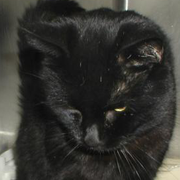 Bombay cats have a very short coat that lies close to their body. They less than an ordinary cat would, and require no grooming at all. Occasional petting and the use of a pet brush is always welcome, however. The coat of the Bombay doesn’t go under an noticeable seasonal changing.
Bombay cats have a very short coat that lies close to their body. They less than an ordinary cat would, and require no grooming at all. Occasional petting and the use of a pet brush is always welcome, however. The coat of the Bombay doesn’t go under an noticeable seasonal changing.
Bombay cat appetites are different from cat to cat. Some Bombay’s eat nothing but cat food while others will stare at you relentlessly while you eat your steak. Most Bombay’s can eat freely without gaining weight, but some owners report they have to occasionally ration the food to prevent their Bombay from becoming overweight.
Breeders of Bombay’s use only quality, vitamin-enriched foods for their cats. They will occasionally feed them raw meat for the purpose of building muscle to show off. This is risky, however, as raw meat is liable to be contaminated and can sicken your Bombay.
Keep Your Bombay Cat Healthy
Follow these guidelines to prevent your Bombay cat from ever getting sick.
- Be sure to remove any hazardous plants from your house. Your Bombay may chew on or eat these plants, and become ill. Don’t think it’s alright if you have the plant up high either, you’ll be surprised where your cat can get to.
- On the contrary to popular belief, don’t feed your cat milk. It upsets their stomach. There is a specific type of milk made just for cats in the cat food aisle of your local grocery store.
- Also on the contrary to popular belief, don’t allow your Bombay to play with a ball of yarn or string unattended. They can easily eat the string which could then lead to serious problems.
- Cats can suffer from common human diseases, such as diabetes. If you fear your cat has such a disease, a call to your local vet couldn’t hurt. Better safe than sorry.
- If you notice buildup in the ears of your Bombay cat or if he tends to tilt his head a certain way, he may be suffering from ear mites. Get more information from your local vet.
- If you notice some sort of gunk coming from your cats eyes or nose, or if your cat isn’t eating or isn’t acting himself, call your local vet. Again, it’s better to be safe than sorry.
Other common symptoms to be aware of that should alert you to contact your vet include:
- Unexplained weight loss
- It’s hard for your Bombay to breathe
- Your cat is constantly throwing up
- Really bad diarrhea
- Your Bombay doesn’t want to eat or drink
- Abnormal inactivity
- Blood in urine or not urinating at all
- Abnormal behaviors
- Sneezing and hacking
- Abnormal aggressiveness
- He isn’t using his litter box

